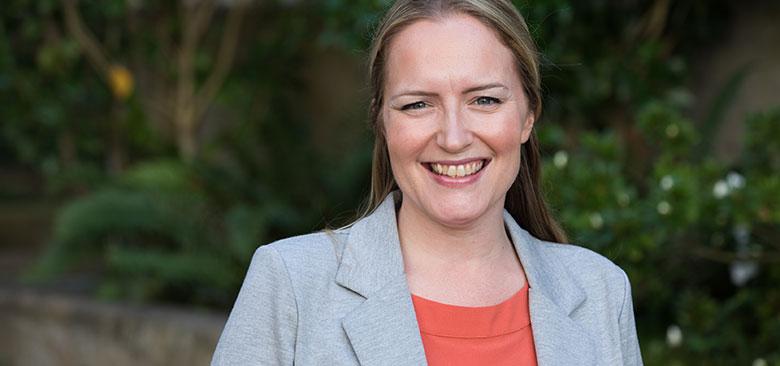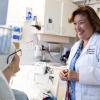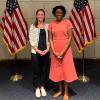
Chelsea Landolin is an assistant professor at the UCSF School of Nursing and chair of the UCSF Academic Senate Committee on Sustainability. (Elisabeth Fall Photography)
A Nurse’s Drive for More Sustainable Practices
As a nurse practitioner, Chelsea Landolin sees the impact of climate change on the patients and communities she serves.
“People are losing their homes and their livelihoods to climate change,” said Landolin, MS, PMHNP, an assistant professor at the UCSF School of Nursing. “We see this with wildfires, hurricanes and droughts. Patients suffer asthma attacks from wildfire smoke, now an inescapable part of life in California.”
Around the country, hurricane flooding and heat stroke from record temperatures are rising causes of death, Landolin said. Climate change is contributing to depression and anxiety; people are fearful of the future, and for themselves, their children and future generations.
“We see very reliably that the costs of climate change are paid first by those who are the least responsible for it, and those who are already the most disadvantaged,” she said. “I don’t know how we can think about health equity without thinking about sustainability.”
As chair of the University of California, San Francisco’s Academic Senate Committee on Sustainability — and the only nurse on the 10-member group — Landolin is leading efforts to advance recommendations and champion solutions that will dramatically cut carbon emissions at UCSF by 2030.
Enhanced Sustainability
UCSF has taken a number of measures to become more sustainable. From 2010 to 2020, the university cut greenhouse gas emissions by 24 percent, reduced energy use by 12 percent, and added 2.5 million square feet of LEED-certified projects. In May, the UC Center for Climate, Health and Equity launched at UCSF to harness the expertise and leadership of the health sector to drive climate action.
The work that Landolin is leading with colleagues on the Academic Senate Committee on Sustainability strives to expand on these efforts and empower the university to further adapt its practices to meet the climate change challenge.
“Climate change is going to be a defining issue for the next few hundred years,” Landolin said. “It will never be just one thing that solves climate change; it will have to be many things.”
Chief among the committee’s initiatives is the transition to full electrification of campus facilities by 2030. Under this initiative, the university would no longer rely on burning natural gas to produce electricity and heat for its medical center and campus buildings, an operation that currently accounts for about 58 percent of its emissions.
The committee is proposing that UCSF develop plans to decommission its power plant and switch to electrical power from renewable sources for all routine energy use. Backup systems, which often rely on fossil fuels, can be re-designed to be greener. Detailed “shovel-ready” projects position the campus to apply for competitive federal green infrastructure funds as they become available.
Other committee initiatives include:
- Re-evaluation of the culture of academic travel and development of new guidance for the campus community
- The annual NorCal Symposium on Climate Resilience in Health Care, presented jointly by UCSF, Stanford and UC Davis, arms health professionals, administrators and trainees with best practices for sustainable health care that mitigate climate change and promote health equity.
- Advocating for creating a new section within the university’s faculty advancement system where faculty can outline their contributions to sustainability. While not mandatory, incorporating this into the faculty advancement system would send a powerful message about the university’s commitment to sustainability, increase faculty awareness about how their actions can reduce emissions, and encourage them to be an agent of change at every level in which they operate, be that as an individual, as a professional, as a member of an institution, or as a member of the international community.
- Working with campus stakeholders to develop a master plan to improve the infrastructure for bicycles, scooters and other micromobility devices.
- Developing learning modules for faculty and health care providers to educate themselves and their patients about climate health.
- Reducing medical waste, such as by better managing medical supplies and eliminating single-use items.
- Fostering a campus dialogue about climate issues through a speaker series organized in collaboration with the new UC Center for Climate, Health and Equity.
The committee makes recommendations to the UCSF Academic Senate, which works with UCSF executive leadership to fulfill the university’s ongoing commitment to sustainability.
The Value of Nurses' Perspective
Marya Zlatnik, MD, a professor in Obstetrics, Gynecology and Reproductive Sciences at UCSF who has worked closely with Landolin as part of the committee, said Landolin’s leadership has helped advance the committee’s efforts.
“Chelsea has a deep understanding of how climate change is impacting the health of humans and our planet,” Zlatnik said. “I’ve found that nurses in general are much more forward-thinking when it comes to sustainability and understanding how the environment impacts health. Chelsea exemplifies how nurses can engage interprofessionally to change how we provide care.”
One significant result that Landolin is proud to have advocated for: the UCSF Academic Senate has established a theme year for 2022-2023 on decarbonizing UCSF. This will allow the committee to engage the greater campus in dialogue and move toward more rapid policy change on issues like electrification and the culture of academic travel.
As a nurse, Landolin brings unique skills and perspective to the sustainability dialogue.
“Nurses have substantial expertise in patient education and understanding the environment their patients occupy,” she said. “We have an opportunity to educate patients about climate change and the impacts of climate change on health, to help them make plans to mitigate those impacts. We can have an enormous impact by educating ourselves, other nurses, and our health professions colleagues to do this work. There is so much opportunity.”
Climate change is an issue that demands urgent action, Landolin said. A mother of two children ages 5 and 7, she is mindful of how actions today shape the future.
“As a parent, I feel strongly that I need to be in this fight against climate change,” Landolin said. “I don’t know how I’d explain it to my children if I wasn’t.”



